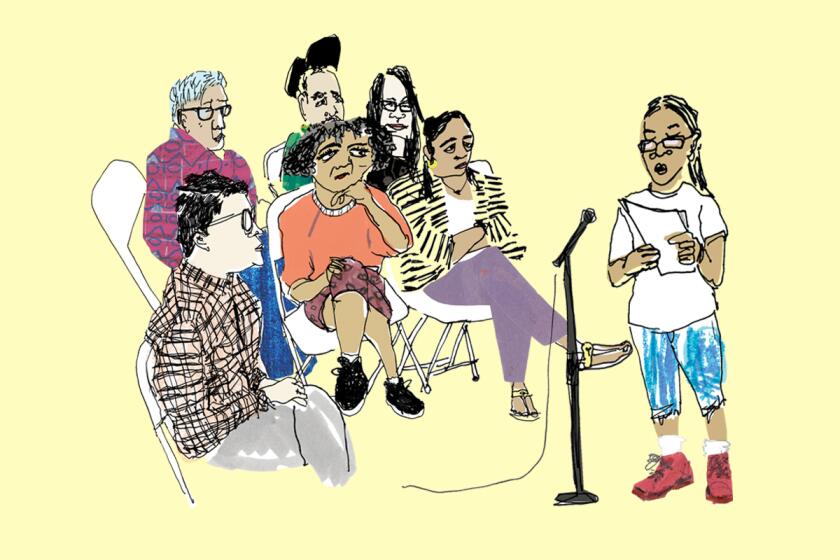‘We have no placement for them’: L.A. County still keeping troubled youths in hotel rooms

Facing an unprecedented shortage of foster homes, some Los Angeles County leaders are calling on the state to fast-track facilities that could care for the most troubled youths under the county’s protection.
The Times reported last month that the county’s Department of Children and Family Services relied on unlicensed hotel rooms to take foster youths it could not find a home for, prompting an outcry from leaders. L.A. schools Supt. Alberto M. Carvalho said he was “appalled.” County Supervisor Kathryn Barger, one of five elected officials who oversee one of the largest child welfare systems in the nation, said she felt that violence was inevitable.
But the practice has continued. As of Wednesday, five foster youths were staying in hotel rooms, according to the county’s child welfare department. Other counties have placed children in former detention facilities and office buildings.
Barger said the department is out of options.
“We have no placement for them,” the supervisor said in an interview.
Barger said she’s not comfortable with the county placing young people in hotels, and she worries that it is dangerous for both staff and the foster youths they are overseeing. But she said changes in state law tied the county’s hands.
Following a wave of scandals over sexual abuse and violence in group homes across California, then-Gov. Jerry Brown signed a landmark law in 2015 that would move the state away from group homes and make it a priority to place young people with relatives or foster families. Many group homes shuttered in the aftermath, and those that remained downsized significantly.
The law, hailed as one of the most significant reforms of California’s child welfare system in decades, left counties with few places to put in their custody young people whose behavioral problems are so severe that that no group home or foster family will take them.
Barger said she believed state legislators needed to move fast to green-light facilities that will.
Two alleged assaults on Los Angeles County social workers by foster children have sparked criticism that such violence was inevitable.
“We need to push the state to rethink the issue surrounding licensed secure sites in the state of California,” said Barger, who got her start in the county advising then-Supervisor Mike Antonovich on child welfare policy. “Because when you have a total of less than 50 beds available for youth … we have a problem.”
She said she was referring to Star View in Torrance and Vista del Mar on the Westside, locked facilities that serve youths with mental illness.
As it stands, every youth facility available to L.A. County can say no to young people who they believe require a more intensive level of care than it can provide.
To open a site that can support youths that no other facility will, the county needs approval from Sacramento, but the Legislature has been reluctant to approve such sites, wary of undermining the push to curtail group homes.
Scott Murray, a spokesperson for the California Department of Social Services, said the agency is working with counties to ensure that every foster youth has a place that will support them. He noted that the governor recently signed a bill to create new places for foster youth who need psychiatric treatment with the goal of quickly moving them to “less restrictive settings.”
“We know that youth who must live apart from their biological parents do best when they are cared for in committed, nurturing family homes,” he said. “It’s critical for youth to remain in the least restrictive, most family-like settings possible, supported by a robust continuum of services to address individual needs.”
But in L.A. County, politicians say hotel rooms remain the least objectionable choice for the foreseeable future.
“We don’t have any other option at this point,” Supervisor Janice Hahn said.
“Having to choose between our foster youth staying in hotel rooms instead of the streets is a last resort,” said Supervisor Holly Mitchell.
Both said they wanted to see the state expand licensing options to better support youths in hotels. Mitchell said she wanted to see more Intensive Treatment Foster Care Homes, which take young people who need a greater level of support. Hahn agreed with Barger that there needed to be more secure facilities, and Hahn called for a new strategy to recruit more foster parents.
Supervisor Hilda Solis cautioned against viewing any one type of placement as an antidote.
“We have seen the dangers of succumbing to a one-size-fits-all approach that simply prioritizes placement of youth while neglecting their needs,” she said. “We must recognize that we will not find the solution with one type of facility.”
The use of hotel rooms has proved detrimental to the young people — placed there with little support or programming — and to staff who watch them. The Investigative Reporting Program at UC Berkeley and The Times reported last month that two social workers had been attacked this year while looking after youth staying in the rooms. One youth had been placed under psychiatric holds more than 20 times.
The county’s child welfare department said a small fraction of the youths under their care are in hotels and that all are between the ages of 18 and 21. Young people placed in these rooms are typically grappling with substance abuse issues, mental health disorders and generational trauma, the agency said, and they have been disconnected from their families. Even if officials find a place for them, the department noted, the young person can reject it.
“We acknowledge that being in a hotel is not an ideal environment for the youth to begin to heal,” department officials wrote in a statement. “Sadly, there is no easy or simple approach to addressing their individual needs based on the currently available housing options.”
After two workers were assaulted, David Green, a county social worker who leads SEIU Local 721, said he convened a meeting with officials from the county’s department and offices that carry some role in child welfare.
“Candidly, I was afraid if it continued as is, and we weren’t going to do anything different, that one of our workers could be killed, and we’re going to be going to a social worker’s funeral,” Green said.
He said the department quickly ushered in short-term changes: a 2-1 staff ratio, de-escalation training, on-site security guards. But he said the group left convinced that if the hotels are to no longer be an option, they would need to work with the state to create a facility that would have a no-refusal policy — required to take all youths referred to them.
Do you know who your L.A. County supervisor is? Do you know how to get her attention? Use Shape Your L.A. to get active in your community.
“A lot of social workers, they can call 20 different foster families, and they’ll just say no,” he said. “They’re just left without any other alternative. That’s not fair for the kids. It’s not fair for the social workers.”
Asked what such a facility would look like, he said it would be easier to describe what it shouldn’t be.
It shouldn’t resemble a juvenile detention center. And it should not look like MacLaren Hall — a facility for foster youth that shuttered in the early 2000s after allegations of systemic abuse.
At the start of this legislative session, Cathy Senderling-McDonald and Diana Boyer with the County Welfare Directors Assn. of California said they’d hoped the bill the association co-sponsored — SB 408 — would beef up the support and staffing offered at the facilities providing the highest-intensity support for foster youth in California.
That language was cut from the bill, and the current version is more narrowly tailored to creating “regional health teams” — made up of a physician, a clinical social worker and a nurse — that would provide care to youths with “complex needs” referred to them. They said the changes meant the bill no longer directly addressed the statewide issue of youth in unlicensed care.
“I mean up and down the state, we’ve seen kids in offices and hotels, overstaying in shelters,” Boyer said. “It’s happening daily.”
Hurd is a reporter for UC Berkeley’s Investigative Reporting Program.
More to Read
Sign up for Essential California
The most important California stories and recommendations in your inbox every morning.
You may occasionally receive promotional content from the Los Angeles Times.













